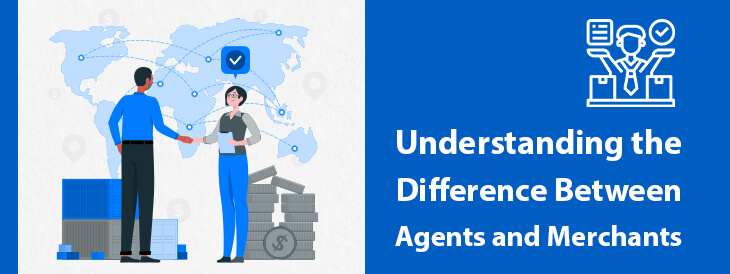Understanding the Difference Between Agents and Merchants
Understanding the Difference Between Agents and Merchants

As the world of commerce continues to evolve, it is important for businesses and consumers alike to understand the various roles and functions within the market. Two terms that are often used interchangeably, but have distinct differences, are agents and merchants.
While both play a crucial role in the buying and selling process, there are certain characteristics that set them apart. In this blog post, we will delve into the difference between agents and merchants and how their roles contribute to the overall functioning of the market.
Understanding Who an Agent is
In the world of commerce, an agent is an individual or a company that acts on behalf of another party, known as the principal, in various business transactions. They act as a mediator between buyers and sellers, negotiating deals and representing the interests of their principal.
Agents can be found in various industries, such as real estate, insurance, and talent management. They play a vital role in connecting parties, ensuring smooth transactions, and maintaining the best interests of their clients.
Some Related Blogs
- The Future Of B2b Payments: What To Expect
- Simplifying The Payment Process With Binary Gateway
- Benefits Of Accepting Credit Cards Over Cash
- The Importance Of Compliance In Payment Processing
The Role of an Agent in Business Transactions
Agents play a critical role in business transactions as they act as intermediaries between buyers and sellers. They negotiate deals on behalf of their clients, ensuring that their interests are represented and protected. Agents have extensive knowledge of the market and use their expertise to find the best deals for their clients.
They facilitate smooth transactions, handle paperwork, and provide valuable guidance throughout the process. Without agents, business transactions would be more challenging and time-consuming for both buyers and sellers.
Unveiling Who a Merchant is
In the world of commerce, a merchant refers to an individual or business entity that is involved in the buying and selling of goods or services. Unlike an agent who acts on behalf of another party, a merchant conducts transactions for their own benefit. Merchants are responsible for sourcing, marketing, and selling products or services to consumers.
They play a crucial role in the economy by providing goods and services to meet the demands of consumers. Merchants can operate in various industries, ranging from retail to e-commerce, and their success relies on their ability to understand market trends and customer preferences.
The Role of a Merchant in Business Transactions
Merchants play a crucial role in business transactions as they are directly involved in the buying and selling of goods or services.
They source, market, and sell products to meet the demands of consumers. Merchants are responsible for ensuring that their products or services are of high quality and meet customer expectations.
They must also understand market trends and customer preferences to effectively sell their offerings. Their success is measured by their ability to attract customers and generate sales.
Overall, merchants are key players in the economy, driving the exchange of goods and services.
Key Differences Between Agents and Merchants
Agents and merchants may both play a role in the buying and selling process, but there are distinct differences between the two. One key difference is that agents act on behalf of another party, while merchants conduct transactions for their own benefit.
Additionally, agents negotiate deals and represent the interests of their clients, while merchants are responsible for sourcing, marketing, and selling products or services. Understanding these differences is important for businesses and consumers to make informed decisions and navigate the market effectively.
Choosing Between an Agent and a Merchant
When it comes to choosing between an agent and a merchant, it’s important to consider your specific needs and goals. If you’re looking for someone to represent your interests and negotiate deals on your behalf, an agent may be the best choice.
On the other hand, if you’re seeking to buy or sell goods or services for your own benefit, a merchant would be more suitable. Take the time to evaluate your requirements and consider the expertise and services offered by both agents and merchants before making your decision.
Impact of Agents and Merchants on Consumers
Agents and merchants both have a significant impact on consumers. Agents work to ensure that consumers are represented and their interests are protected in business transactions. They help consumers find the best deals and navigate the market effectively. On the other hand, merchants directly provide goods and services to consumers, meeting their demands and preferences.
They play a vital role in driving the exchange of goods and services, ultimately enhancing the overall consumer experience. Whether it’s through representation or direct selling, agents and merchants contribute to creating a more efficient and satisfying marketplace for consumers.
![]()
Email us anytime!
Email customer service 24/7 at info@binarygateways.com
![]()
Call us anytime!
Reach customer care 24/7 at (801) 761-5001
